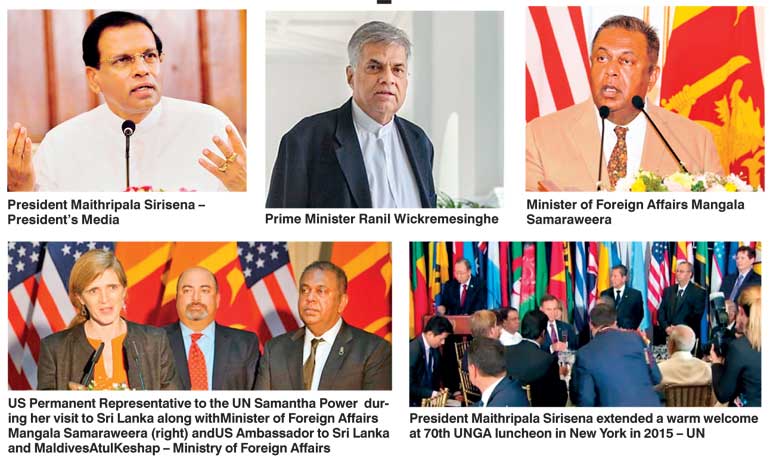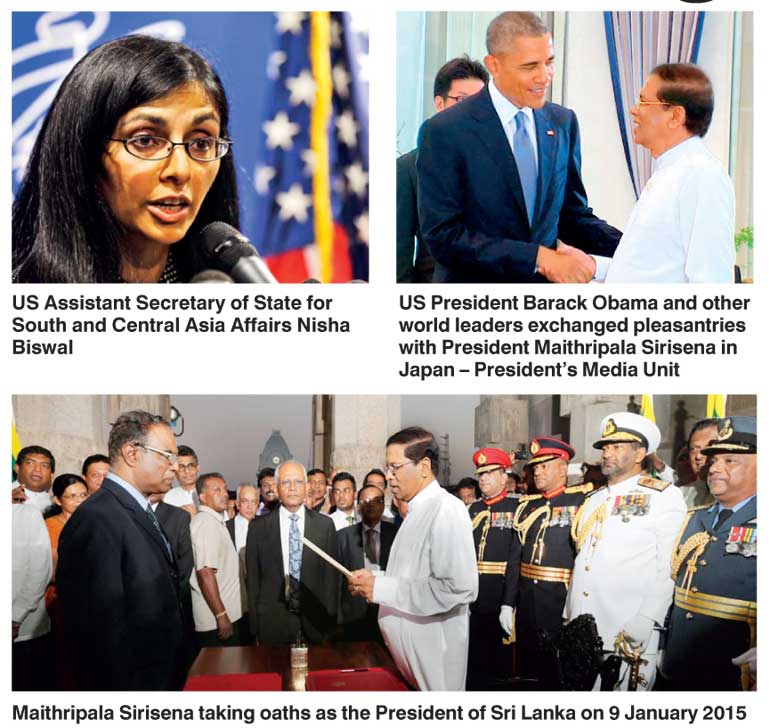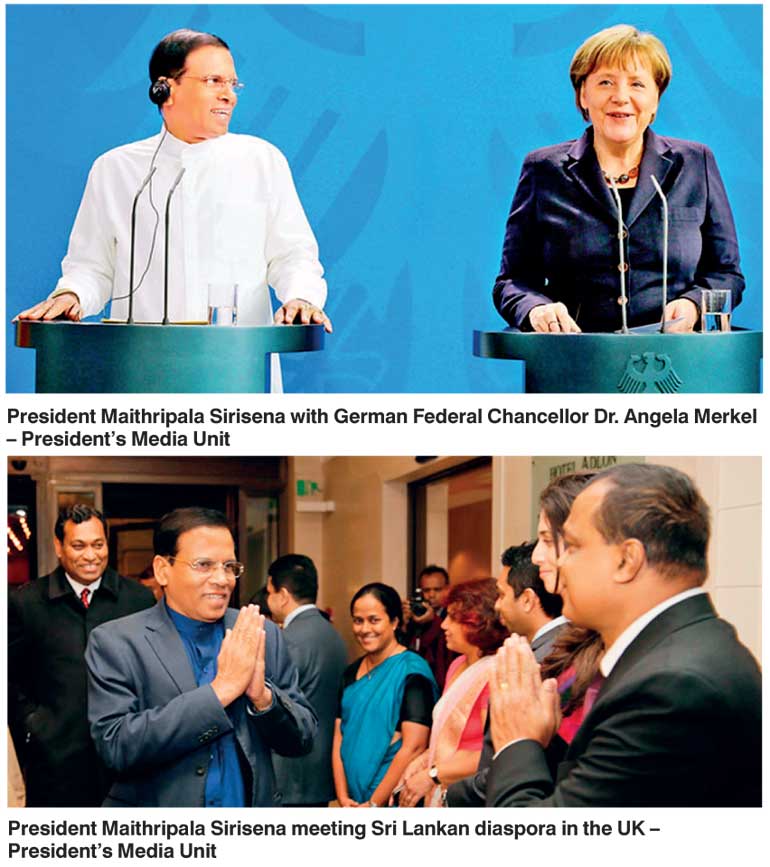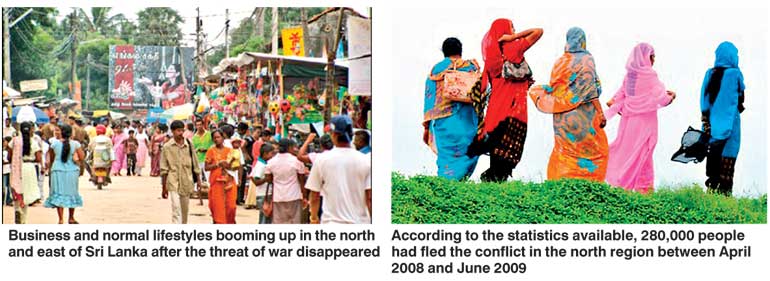Monday Feb 23, 2026
Monday Feb 23, 2026
Tuesday, 23 August 2016 00:01 - - {{hitsCtrl.values.hits}}
By Hishan Welmilla
After a massive military campaign, the Sri Lankan military defeated the terrorist group Liberation Tigers of Tamil Elam alias LTTE which fought for a separate state in Sri Lanka in May 2009, bringing the civil war to an end.
With the end of the conflict between the Sri Lankan Government and the LTTE, the then-Government of Sri Lanka which was under Sri Lanka’s former President Mahinda Rajapaksa, focused on reconstruction and rehabilitation of the affected areas of the north and east, including the rehabilitation and the reintegration into society of former LTTE child soldiers and combatants.

A massive infrastructure development drive was launched to rebuild houses, roads, bridges, schools and medical facilities in these areas, as well as clearing of large tracts of land from landmines to allow the return of IDPs to their homes.
However, six years after the end of the armed conflict, there remained a sense that Sri Lanka had not succeeded in winning peace and harmony. A new Government was elected in January 2015, which adopted the two-pronged policy of reconciliation and development, conscious that one without the other would not lead to genuine reconciliation among the diverse communities that make up Sri Lanka.
The new Government committed itself to a holistic and ambitious post-conflict reconciliation approach. This was clearly manifested in September 2015, when Sri Lanka co-sponsored with the United States and several other countries – a Resolution in the Human Rights Council, for implementing several measures domestically, including to evolve mechanisms for truth-seeking, justice, reparation, and guarantees of non-recurrence.

The Sri Lankan diaspora is spread out all over the world, but is concentrated in several key regions. Canada, United Kingdom, Western Europe, Middle East and Australia are some of the major destinations attracting Sri Lankan migrants. Inflow to Australia, United Kingdom and USA has increased beginning of the last three decades.
The majority of the Sri Lankans living in those countries are Tamils. Since the outbreak of war in 1983, the Tamil diaspora has been a key component in the economy of Sri Lanka as they also contributed to Sri Lanka’s remittance inflows particularly in the areas of north and east of the country where there are large concentration of the Tamil Population.
According to the latest published statistics in the Migrant Profile (2015) issued by Ministry of Foreign Employment Promotion and Welfare of Sri Lanka, the diaspora is estimated at one and half million as of 2015
As with Tamil migration, migration flows among the Sinhalese also increased during the period of intense conflict, as a result of which the country’s economic prospects dimmed. However unlike the majority of Tamil diaspora, Sinhalese migrants tended to leave the country for economic rather than political and security reasons.
President Maithripala Sirisena also believe that the reconciliation could be achieve by respecting the rights of all communities and treat all equally, He also believes that diaspora can create a major impact on the development process of Sri Lanka and he has already invited them to be a part of development of Sri Lanka.
“We always say that all of us should live together in harmony,” said Sirisena when he visited Jaffna to hand over the lands claimed by the Government during the war to the respective owners in June this year
“We always talk about equality in our society. Therefore don’t you think we should allow everyone to give an opportunity to enjoy their rights? Everyone needs a happy life. Therefore I urged to all the communities to work towards this. Let’s work together to bring this about in our country, leaving aside all differences,” Sirisena added.
This is for the first time that any Sri Lankan Government has made such commitments to work with international partners as well, to address human rights and humanitarian issues affecting Sri Lanka.

Since the election of the present Government, Sri Lanka has made impressive strides promoting good governance, rule of law and equality and justice. This fact has been widely acknowledged by the International Community. For instance, US Ambassador to the UN, Samantha Power, during her visit to Sri Lanka in November 2015 stated that she could not think of any other country where there has been so much positive change in such a short period of time.
“Sri Lanka really stands out as a place and people have given a world a great hope,” said Power when she visited Sri Lanka. “It’s a country that dealt with terrorism itself and now it’s dealing with very difficult legacies of a long and very arduous civil conflict but it’s putting one foot in front of the other, facing hard problems and again, showing no signs of moving away from confronting the difficult issues of the past in order to help to contribute to that brighter future.”

One of the major achievements of the Government was the adoption of the 19th Amendment to the Constitution in April 2015 which reinvigorated democracy though a redistribution of executive power, reintroduction of term limits of the presidency and the introduction of independent bodies for appointment and oversight of key institutions including the Judiciary, Police, Public Service, etc. More recently, in April 2016 the Parliament met for the first time as a Constitutional Assembly, initiating the process of drafting a new Constitution, with a view to consolidating democracy and promoting reconciliation.
This monumental transformation in Sri Lanka has in turn paved the way for more strengthened relationships with Sri Lanka’s friends and partners in the International Community, in particular with the United Nations and the United States
US Assistant Secretary of State for South and Central Asia Affairs Nisha Biswal during her recent visit to Sri Lanka has mentioned that Sri Lanka’s journey has had more than its fair share of darkness and division and of the devastation of war, but what is remarkable is the resilience of its democracy and the determination of its people to seek out a new future for all of its citizens, and to refuse to remained mired in the past. She also empathised that determination found voice in the 8 January 2015 which brought in new leadership that rejected the political fear and divisions and south to bring about a unified Sri Lanka.

Notwithstanding this progress, sustaining the vigour of the reconciliation process and democratic reforms, among other factors, is centred on economic development, as the general public demands a quick peace dividend. Today, due to past fiscal profligacy, Sri Lanka suffers a debt burden, a very low tax to GDP ratio compounds matters. While Sri Lanka is a low middle income country, the challenge of incorporating the bottom 40% of the population in Sri Lanka’s push to become a higher middle income country is another onerous task.
Prime Minister Ranil Wickremesinghe is also of the view that forming a National Government by bringing together the two major political parties has given the opportunity to work out a policy framework in agreement on the unity and reconciliation. That has given an assurance to the diaspora, the commitment of the Government of Sri Lanka to develop Sri Lanka and also make their way back to their homelands and work towards the development of the country with the expertise and the knowledge.
“We have a Government formed by the two leading parties in Sri Lanka which have so far contended for power since 1956 onwards,” said Wickremesinghe during his official visit to India on the invitation of the Indian Prime Minister Narendra Modi soon after forming the new Government.
“We are together for two years to see how we can work out a work out a policy framework in agreement on unity and reconciliation. We are looking at how power sharing and devolution takes place within the Constitution as a unitary state and there are many more things to be done,” the Premier added.

Meanwhile, the Government envisages a role for the diaspora of all communities towards rebuilding the country, both in supporting the reconciliation process and in contributing to the economic development in all regions.
Expressing his views on the diaspora at a conference on Advancing Reconciliation and Development in Sri Lanka at the United States Institute of Peace, Minister of Foreign Affairs Mangala Samaraweera stated that Sri Lanka is looking forward to obtain the support of Sri Lankan diaspora in building the future of Sri Lanka
“In fact it has been our main thrust; it has been a greatest thrust for last 12 months. In fact we have had many discussions with the Tamil diaspora. They have expressed great deal of interest to work in unison with the Government,” said Samaraweera.
International support for Sri Lanka’s domestic efforts to promote democracy, reconciliation, and economic development is invaluable. Young professionals of Sri Lankan heritage as well as the wider diaspora can make a substantial contribution to reconciliation and economic development efforts back in Sri Lanka. They have a unique opportunity to use their acquired skills and knowledge to positively influence the work of their brothers and sisters in Sri Lanka.
They can serve as roving ambassadors for Sri Lanka when they return to the U.S. and other countries of residence. They are in a position to educate their expansive networks about realities in Sri Lanka in an objective manner, not only of its natural beauty, but the achievements in the physical quality of life, and of course the challenges, and as to how communities abroad can assist Sri Lanka to meet such challenges. They are in a unique position to dispel some myths and misrepresentations that are prevalent with regard to Sri Lanka.

Moreover, their work in Sri Lanka would provide an opportunity for those establishments with whom they work to learn and understand competencies and work ethics of the communities and institutions they represent. This programme is indeed an excellent process of two-way learning and mutual exchange of skills.
The long-drawn conflict in Sri Lanka saw the departure of many Sri Lankans in search of greener pastures. Sri Lanka lost many of our skilled and educated people.
The armed conflict and the politics surrounding it polarised the debate on solutions to outstanding political issues in the country.
Often, there was little room for input by moderate voices in Sri Lanka and abroad. The path taken by the Government to reinvigorate Sri Lanka’s democratic roots and the commitment for promoting reconciliation has empowered moderate voices and their leverage has increased.
There is now a real possibility of generating a national consensus on political solutions to all outstanding issues, such as the nature of the State, devolution of power, and reforms in electoral representation. The challenge for the Government and the people of Sri Lanka remains the extreme elements both within and outside Sri Lanka whose interest and objectives are at variance with the general view of Sri Lankans.
With the Government’s commitment to advancing democracy and promoting reconciliation, exciting new economic opportunities are opening up for international businesses and investors with special incentives for Sri Lankan expatriates. Many in the overseas Sri Lankan diaspora are crucial stakeholders in the reconciliation process. Many in Sri Lankan diaspora are very well-educated, diligent, and successful –highly qualified professionals, senior officials, legislators, and managers. And most of them have a strong sense of identity with Sri Lanka. In this context, all diaspora groups have the potential of becoming partners in Sri Lanka’s social and economic development, for the benefit of both their home countries and mother country Sri Lanka.